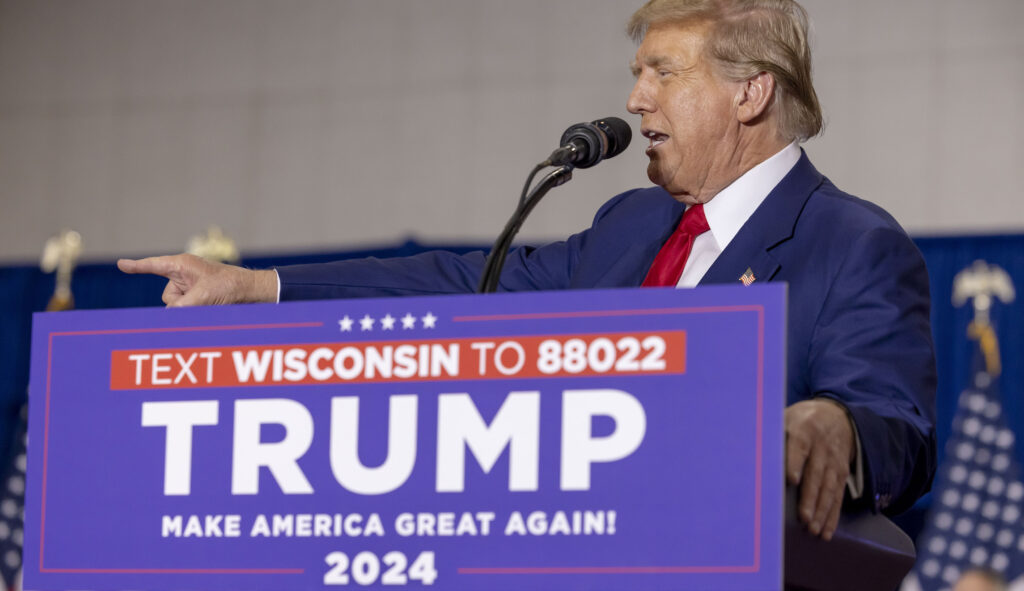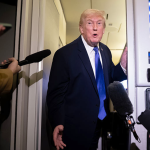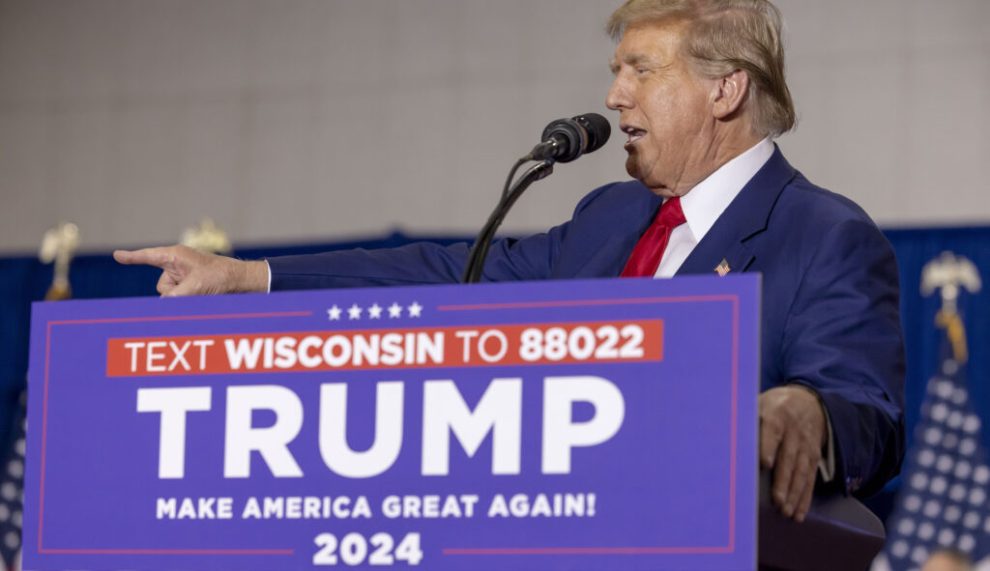Former President Donald Trump’s visit to Wisconsin on Tuesday will give him a chance to move past allegations he called Milwaukee a “horrible city” in a meeting with House Republicans last week.
The former president will address a crowd in Racine, a city south of Milwaukee, in an event billed as attacking “Joe Biden’s failed presidency.” But an open question is whether Trump attempts to clarify comments he made on Thursday as House Republicans hosted him for a closed-door meeting in Washington, D.C.
Wisconsin lawmakers in the room deny Trump referred to Milwaukee, where the GOP will anoint him as their presidential nominee next month, as a “horrible city” as journalist Jake Sherman reported at the time. But their varying and at times contradictory accounts of what he did say helped balloon the story into a firestorm and suggested a degree of panic that his remarks could cost them in a state Trump narrowly won and then lost in his prior two runs for president.
Rep. Bryan Steil (R-WI), who represents parts of Milwaukee County, initially denied Trump called the city “horrible” but later acknowledged he brought up “specific issues” there. Other members of his delegation said Trump was referring to the crime rate and unsubstantiated allegations of election fraud.
Trump has weathered other comments that Republicans say were taken out of context. When he warned of a “bloodbath” in March if President Joe Biden wins the election, made in the context of a trade war with China, his comments were interpreted as a call for political violence.
But with his prospects for a second term on the line — Wisconsin was one of three blue-wall states that sent him to the White House in 2016 — at least some Republicans believe the “horrible city” comment, real or misquoted, undercuts the months of planning they have put into hosting a July convention they hope will make inroads in the state.
The Democratic National Committee quickly paid for billboards plastering the comments around the city, while the Biden campaign also ran a full-page ad in the Milwaukee Journal Sentinel’s Sunday paper.
“Trump’s comments are less than ideal,” one GOP operative familiar with Wisconsin said, speaking on condition of anonymity. “This is the sort of thing that fires up Democrats.”
GOP strategists in the state told the Washington Examiner they were not worried about the comments causing lasting damage, with the election hinging on the same issues that are top of mind for voters in every battleground state: inflation, the border, crime, and foreign policy.
But Trump’s remarks were nonetheless a “huge story” in Milwaukee, according to Bill McCoshen, the former chief of staff to ex-Gov. Tommy Thompson. Tuesday’s rally, he said, gives Trump an opportunity to counter the news cycle.
“Ignoring it would be a mistake. He should hit it, and he should hit it head-on,” McCoshen said, suggesting that Trump offer a “positive vision of why he loves Wisconsin, why he loves Milwaukee.”
Republicans don’t expect to win Milwaukee in November — the county went for Biden by 40 points in 2020. But the city is not the progressive bastion neighboring Madison is known to be and is thought of differently by sports die-hards across the state who root for the Milwaukee Brewers and Bucks.
As the largest metropolitan area in Wisconsin, it’s also the biggest source of votes for both parties.
Part of Republicans’ convention strategy has been to build goodwill in Milwaukee itself, with delegates donating school supplies and the Republican National Committee placing $100,000 in a minority-owned bank. Even a small shift in the share of residents casting votes for Trump could turn the outcome of the election, while his comments could have repercussions with suburban Wisconsinites who identify with the city.
“Milwaukee is not Chicago or New York City. It’s a well-liked city in the state even if it has real flaws,” the first operative said, comparing Trump’s comment to President Barack Obama’s infamous “You didn’t build that” line during his 2012 run for reelection — a remark easily ripped of context and used as campaign fodder by opponents.

Trump’s visit to Racine is evidence of the state’s importance. It will be his third trip to Wisconsin since announcing his 2024 run.
But McCoshen urged Trump to make visits to Milwaukee itself beyond the July convention, noting he needs to pull in 30% of the county vote if he hopes to win in November. He fell just short of that threshold in 2020 and ultimately lost the state to Biden by little more than 20,000 votes.
The same goes for Dane County, home to the city of Madison, he said: “You can’t get crushed in those two counties, and that’s what happened in 2020.”
Trump’s emphasis on public safety fits into a broader Republican narrative that Democrats’ policies have led to the crime wave of recent years. Those numbers have begun to recede following a spike during the pandemic, in Milwaukee and elsewhere, but Republicans still believe it could be persuasive with swing voters.
McCoshen saw no problem with Trump riffing on crime, as he did in his meeting with House Republicans, but advised that he emphasize how he plans to address it at his rally.
CLICK HERE TO READ MORE FROM THE WASHINGTON EXAMINER
“Don’t just present problems — present solutions,” he said.
On allegations of voter fraud, he suggested Trump steer clear altogether. “With the general population, that will not play well,” McCoshen said. “It’s never a good idea in a campaign to be looking backwards. You always want to be looking forward.”
























